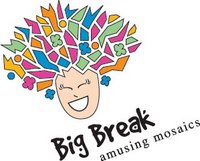I've been thinking a lot lately about something Marianne Williamson said in one of her lectures (I recently bought a 4 CD set of some of her live speeches called "Letting Go and Becoming"). She talks in one of her speeches about how it is becoming necessary for us to seek an equal balance of mind and heart.
Of course, I relate everything I read, hear, watch, etc. to business, so I'm theorizing about this in terms of Jim Collins' Level 5 leaders (from
Good to Great).
Collins, despite his best efforts in doing strict numbers-based research for the book, couldn't deny that there was some thread of
something that ran through the leaders of the 11 companies that made the cut. Collins didn't want this "soft stuff" to impact his hard numbers, but his researchers (he calls them "chimps") convinced him that there was something to this area of leadership that they were discovering. Collins eventually came to call these leaders Level 5 Leaders. I'll come back to the Level 5 dialogue in a minute.
According to Marianne Williamson, we are all composed of both masculine and feminine energy - there is something about your human experience that will identify more with one or the other in your lifetime, but the balance of the universe has to do with an equal honoring of both. Our civilization has traditionally overemphasized the masculine worldview. The masculine mind is focused on externals. In Western civilization we focus a lot on the REAL - whether or not I can put my hands on it - whether or not I can register it with my physical senses. When the masculine energy thinks of changing, it works to change something that already exists. It thinks in terms of taking something you don't like and substituting something you do like. On the other hand, it is a feminine function to
create what you do want. Creating is when you bring
something out of
no-thing.
Masculine energy is dynamic. It DOES. Feminine consciousness is not dynamic, but magnetic. It is more about BEING.
We've been taught that in order to be "successful" we need to DO something - we need to CHANGE something - we need to show
results. It's what we can
see and
touch that matters. We really believe that touchy feely stuff won't bring about any changes because we can't
see or
measure the results.
But we need to go within in order to create the world anew. If we really want things to be different in our worklives and really in our whole lives, we need to think about
creating, not
making. How is it working in our lives to MAKE somebody DO something? What if we stopped trying to change everyone else and went inside and thought about TRANSFORMING ourselves?
I wonder if that's what Collins meant when he described the distinction between Level 4 and Level 5 leadership. He describes a Level 4 leader as one who "catalyzes commitment to and vigorous pursuit of a clear and compelling vision, stimulating higher performance standards" (in other words,
dynamic). His definition of a Level 5 leader is one who "builds enduring greatness through a paradoxical blend of personal humility and professional will" (page 20) (in other words,
magnetic).
Maybe the
Good to Great Level 5 leaders - all 11 of them (and all male, by the way) - were leaders who were more in touch with their feminine or magnetic energy. Maybe they were the ones who encouraged creativity within their workplaces. Think of the most successful leaders you've encountered in your life, whether at work or at home or at school or in some other activity. Would you say that they exhibited more Level 5 or Level 4 behaviors? Were they more dynamic or more magnetic? Were they Do-ers or Be-ers?
Certainly there is always some combination of the masculine and the feminine, of the dynamic and magnetic - and in fact, isn't that the goal: to achieve a balance? But I'm beginning to discover, at least for myself, that I'm much more effective as a speaker, a trainer, a facilitator, and even as a friend, sister, daughter, aunt, when I identify and listen to my feminine or magnetic side, which I thought I needed to deny to be successful as an athlete and later in Corporate America (both areas which traditionally reward the dynamic over the magnetic).
Whether you're male or female, it seems that the magnetism of feminine energy might provide at least some great conversation.
What do you think? What are you seeing? I'd love to hear about your observations, both of yourself and those around you.























